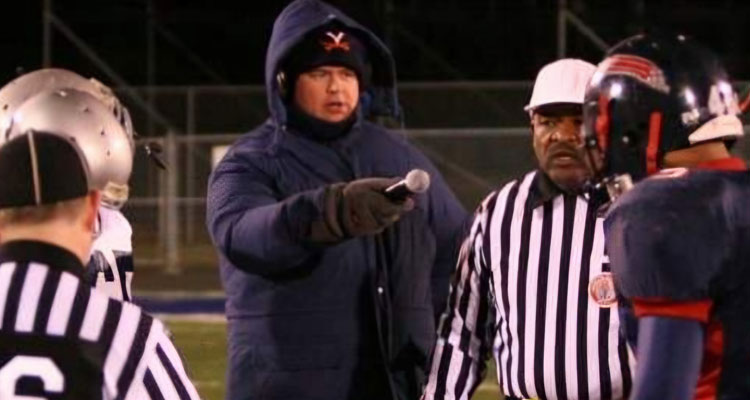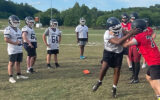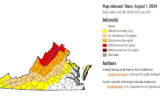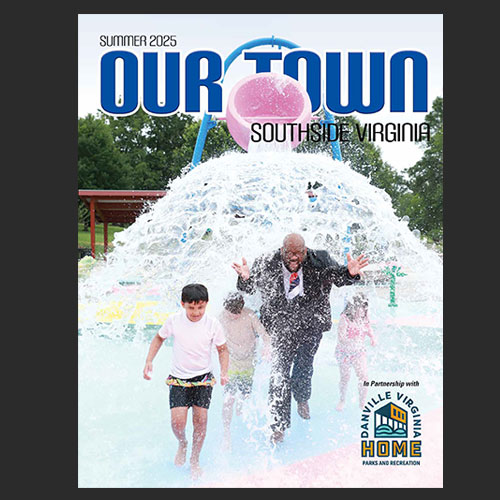If you love local high school football, you may be familiar with a voice that has been painting vivid pictures of every thrilling play for over two decades. Clarke Whitfield, a respected attorney by day and a passionate sports broadcaster by night, has become an integral part of the George Washington High School Eagles’ football legacy. His journey from sideline reporter to color commentator is a testament to his love for the game and the community he serves.
Whitfield’s story begins far from the broadcast booth. A 1986 graduate of George Washington High School himself, he pursued a legal career, earning degrees from the University of Virginia and Regent University School of Law. After five years in private practice, he found his home in the Danville City Attorney’s Office, where he has served for 26 years, the last 20 as City Attorney.
But it was in 2002 that Whitfield’s life took an unexpected turn. Chuck Vipperman, a local broadcasting legend, asked him to fill in as a sideline reporter for four games. Little did Whitfield know that this temporary gig would develop into a two-decade passion project.
“I grew up loving sports and always kind of wished that I could have made a career in sports journalism,” Whitfield recalls. “So, when the opportunity to join an award-winning broadcast and get paid for talking about football came up, I jumped at the chance.”
From 2003 onwards, Whitfield became a fixture on Eagles’ broadcasts, first as a full-time sideline reporter and later as a color commentator. His legal background, combined with his deep understanding of the game, brought a unique perspective to the airwaves.
Over the years, Whitfield has witnessed countless memorable moments on the field. He vividly remembers a 99-yard touchdown run by Haylen Murphy in 2005, the longest in GW football history. Another standout memory is David Wilson’s spectacular “flip” into the end zone on Halloween night in 2008, a play that has become part of local football lore.
But it’s not just the highlight-reel plays that Whitfield cherishes. He speaks fondly of the friendships formed with his broadcasting colleagues and the conversations shared on long road trips. These personal connections, he says, are the true treasures of his broadcasting career.
Whitfield’s time behind the microphone hasn’t been without its challenges. He recalls two games that tested his mettle as a broadcaster. The first, dubbed the “Fog Bowl,” took place in 2004 at Stonewall Jackson High School in Manassas. A thick fog rolled in at the kickoff, forcing Whitfield to become the eyes for his colleagues in the press box who couldn’t see the visitor’s sideline.
The second memorable weather event occurred during a 2008 playoff game at Liberty Belton. With temperatures dipping into the teens and snow falling in the third quarter, Whitfield experienced the coldest game of his career. “Through it all,” he chuckles, “then head coach Dan Newell was wearing shorts.”
These experiences taught Whitfield valuable life lessons. “It’s all for fun, but some people take it WAY too seriously,” he reflects. “They’re kids down on the field, so you have to cut them some slack. They’re all giving 100% in every game, and nobody is more upset than the coaches and players when they lose.”
Whitfield’s appreciation for the dedication of coaches and their families has deepened over the years. He has witnessed firsthand the care and commitment they show to their players, often extending far beyond the field.
After 22 years, Whitfield made the tough decision to step away from broadcasting in 2020. The pandemic-induced pause in fall football allowed him to explore other interests with his wife, Jaci. They discovered a world of outdoor concerts and weekend hikes, leading Whitfield to realize it was time to pass the torch.
For those aspiring to follow in his footsteps, Whitfield offers sage advice: “Start really paying attention to the announcers on radio and TV. Then watch games on TV with the volume down and practice doing play-by-play and color commentating. Most of all, do it for the love of the game, the love of the kids, and not the money.”
As he reflects on his broadcasting career, Whitfield expresses deep gratitude to the coaches who’ve been part of his journey. He particularly thanks Dan Newell, Bobby Martin, Jimmy Teague, and Nick Anderson for their friendship and professionalism, especially during post-game interviews after difficult losses.
Clarke Whitfield’s story is more than just about sports broadcasting. It’s a narrative of community involvement, lifelong learning, and the power of pursuing one’s passions. From the sidelines to the press box, he has not just called the game—he has become a part of its fabric, weaving together the stories of young athletes, dedicated coaches, and a community united by its love for high school football.
As the Friday night lights continue to shine on George Washington High School’s football field, Whitfield’s legacy remains. His voice may no longer echo through the airwaves, but the impact of his dedication, insight, and love for the game will resonate for years to come in the hearts of Eagles’ fans and the Danville community.









